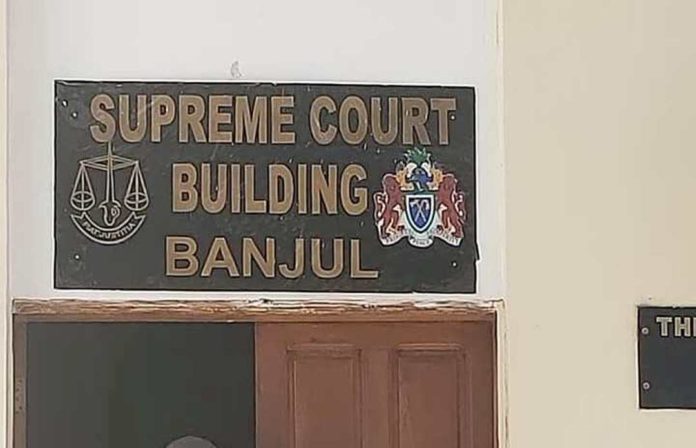By Yankuba Jallow
Lawyers in the United Democratic Party (UDP) election petition case against President Adama Barrow, the Independent Electoral Commission and the Attorney General on Friday argued on the motion brought by lawyers for the President seeking to dismiss the suit.
Sheriff Marie Tambadou for President Adama Barrow said the affidavit in-support of the motion was sworn to by one Seedy Njie, the Deputy Spokesperson of the National People’s Party (NPP). Tambadou said they are seeking dismissal of the election petition case. He stressed that there was non-compliance to the provisions of the Elections Act and the rules of filing election petition.
He said the UDP election petition was filed on the 14th December 2021, which was the 9th day after the elections results. He added that the party filed an amended petition on the 15th December 2021. He explained that the petitioners obtained a court order dated the 16th December 2021 for the Independent Electoral Commission to be joined.
Barrister Tambadou said Rule 12 of the Elections Petition Rules sub-rule 1 states that every petition shall be served on the respondents adding where service couldn’t be done on the respondent, the court may order for a substituted service.
“There was no service on the 1st Respondent [the President],” he said.
Tambadou added: “Neither the petition nor the amended petition was served on the Respondent [President Barrow].”
Tambadou said UDP’s affidavit in-opposition sworn to by one Oly Dibba on the 22nd December confirmed that service was done on one Alagie Ceesay.
“I submit that this not personal service. Personal service is a mandatory requirement. The petition must comply with this mandatory requirement of this provision,” Tambadou said.
He explained that if the petitioner encounters difficulties in doing the personal service on the President, the law provides for a procedure, which is by coming back to the court for a substituted service.
Tambadou emphasized that the rules of election petition should be observed.
“Failure to comply with the provision is fatal to the petition,” he said.
He cited two Gambian decided cases of Jim Jagne and Abdoulie Gibou Gaye [1992] and the case of Sheriff Dibba [1982]. He said where there is no service on the Respondents; the process becomes void ‘ab initio.’
“You cannot put something on nothing,” he said.
He said Chief Justice Hassan B. Jallow, sitting as a lone judge, on the 16th December 2021 issued an order for IEC to be added,
“That order focuses only for the joinder [of IEC]. It was not an order for the petition to be amended. There is no application for the amendment to be made,” Tambadou said.
He added: “The amendment of the Petition by the petitioner was made a day before the order for the joinder [of the IEC to the case] was made.”
The Senior Lawyer submitted that UDP should have first applied to the court before going ahead to amend their motion without obtaining leave of court. He said what the court order was for the IEC to be served with the processes forthwith.
“The simple fact is there was no application for amendment,” he said.
Lawyer Tambadou challenged the Order saying it was made ex-parte which is against the Rules of elections petition.
“That order could not amount to an amendment because under Rule 22 of the Elections Petition Rules states that any application should be made on notice,” he said.
He submitted that as far as they are concerned, there is no amended petition. He said the IEC was joined in the suit after 10 days of the announcement of the results adding this was not a proper procedure.
“At the time the Order was made the 10 days had already expired,” he said.
He said the UDP petition contains several paragraphs with allegation on the IEC.
“Those paragraphs have nothing to do with President Adama Barrow. Therefore, the Petition is barred and ought to be struck out,” he said.
Barrister Tambadou said when a Petition has irregularities – non-compliance with the rules of petition would result in the dismissal of the Petition.
“The Court Order should be set-aside as a nullity for non-compliance with the Rules,” he said.
He said once you start your process on notice, you need to continue on notice but you cannot start on notice and you go back on ex-parte.
“The petition was not properly filed and served,” Tambadou said, adding “the irregularities make it impossible for this court to hear this [UDP] Petition.”
He urged the court to dismiss the Petition and to do so with cost.
Lawyer Kebba Sanyang for IECassociated himself with the submissions of Lawyer Tambadou.
Hussein Thomasi, the Solicitor General and Legal Secretary, who appeared for the Attorney General said the case is of absolute public importance which goes beyond the interest and concerns of the parties in the case. He agreed generally with the submissions of Lawyer Tambadou. He stressed that elections laws should be interpreted strictly.
Thomasi submitted that the failure to comply with the rules of procedure in a petition case amounts to a nullity. He said it suffices to say that there are ample authorities in the jurisdiction and outside authorities to the effect that failure to comply with the Elections Act will be fatal and thus, render it a nullity.
“The suit should be dismissed, giving the fact that public anticipation, public interest and peace, and stability of the country are all matters at stake,” he said.
Lawyer Bory S. Touray, for UDP said the motion brought by the lawyers for President Adama Barrow seeking dismissal of the suit lacks merit as he urged the court to dismiss it.
Touray submitted that the election results were announced on a Sunday, which was a non-working day relying on section 32 of the Interpretation Act. He argued that the Petition was filed on the 14th December which was the 8th day following the announcement of the results.
On the issue of service, Lawyer Touray said service was not at the instance of UDP adding service was done by a court process server. Touray averred that President Barrow accepted through his protocol officer.
At hearing this, Lawyer Tambadou stood up and indicated his objection to Lawyer Touray’s line of submission saying he should be talking about facts before the court.
“It is not contained anywhere,” Chief Justice Jallow said.
Lawyer Bory S. Touray maintained that it is contained in the affidavit in-support sworn to by Seedy Njie citing paragraph 4. Touray stressed that IEC is a necessary party in the suit adding the court has the power to order for the IEC to be added in the suit.
Touray said Tambadou’s argument that leave was not obtained from the court before the UDP amended their petition was wrong. He said this has been overtaken by event adding leave of court was obtained.
“The motion and all evidence canvassed should be thrown out through the window,” he said.
Barrow’s Lawyer Says UDP has Failed to Follow Election Petition Rules
By Yankuba Jallow
Lawyer Sheriff Marie Tambadou for President Adama Barrow has on Friday morning moved a motion seeking the dismissal of the UDP election petition case accusing the party of not following the proper elections petition rules in bringing the case.
Appearing before the five panelists of the Gambia Supreme Court, Senior Lawyer Tambadou said the Petitioners (UDP) should file and serve a notice of presentation of the petition within 5 days from the date of presentation of the petition.
“At no time was President Adama Barrow provided with the notice of the motion,” he said, adding “This requirement is mandatory.”
Tambadou said non-compliance with rules renders the proceedings fatal, which would consequently amount to the dismissal of the suit.
“The only issue for determination is, whether, non-compliance with Rule 11 is fatal to the petition,” he said.
Tambadou said the said Rule 11 is mandatory adding where a Petitioner [herein UDP] failed to comply with it, then the proceedings become a nullity.
He said Rule 11 does not require a letter from the Registrar of the courts or a letter.
“This petition has not fulfilled the requirements envisaged under Rule 11,” he said.
Rule 11 is titled “Time for Giving Notice” provides that “Notice of presentation of a petition and the nature of the proposed security accompanied by a copy of the petition shall be served by the petitioner on the respondent within five days after the presentation, exclusively of the day of prosecution.”
Lawyer Tambadou said Rule 11 is specific as to what needs to be done in a petition case. In addition, he referred the court to some common law authorities to support his position that Rule 11 is mandatory.
“Service of the notice within the prescribed time is a condition precedent before the trial commences,” he said.
He urged the Court to hold that UDP did not comply with the provision of Rule 11 of the Election Petition Rules.
Lawyer Kebba Sanyang and Malick H.B. Jallow associated themselves with the arguments put forward by Barrister Tambadou.
Deputy Director of Civil Litigation, Kimbeng T. Tah for the Attorney General said the election petition is not common law or equity proceeding.
“It is a statutory proceeding,” he said, adding it is governed by the Constitution, the Elections Act, and the Rules of Election Petition. He stressed that the Supreme Court is confined to these laws. Lawyer Tah cited some decided cases in Nigeria to support his argument.
Lawyer Bory S. Touray for UDP said some of the issues that Lawyer Tambadou raised in his argument amount to “trial by ambush”. He added that these arguments were not contained in their motion.
He submitted Rule 11 does not apply in this case because it is dispelled by Section 49 of the Constitution.
Section 49 provides “Any registered political party which has participated in the
Presidential election or an independent candidate who has participated in such an election may apply to the Supreme Court to determine the validity of the election of a President by filing a petition within ten days of the declaration of the result of the election.”
Lawyer Touray said the Constitution takes precedent over the Rules of Election Petition. Touray submitted that the Elections Act was enacted through a military degree of 1996 while the 1997 Constitution came into being after the President was sworn-in in 1997.
He argued that the requirement to file a notice of petition and security under Rule 11 does not apply to presidential elections, but rather it applies to National Assembly, Local Government, and other subsidiary elections.
Lawyer Touray cited Rule 52 which provides for what should be contained in a petition.
“Rule 11 is different from Section 49 of the Constitution,” he said.
He submitted that on the issue of the election petition as it regards presidential elections, the Constitution (Section 49) only applies. He argued that the petition was brought pursuant to the Constitution and not the Elections Act.
On the issue of service, Touray said it behoves the court to serve the other parties in the case.
“We acted all due diligence in so far as service is concerned in this suit,” Touray said.
He submitted that the case laws Lawyers Tambadou and Tah cited are only relevant to those deciding countries.
“Our Constitution and Supreme Court Rules are very clear. What our laws envisage is that the petition should be filed directly to the Supreme Court,” he said.
He asked the court to dismiss the motion and award cost in their favour.
Lawyer Tambadou in his reply on points of law said the UDP petition was brought pursuant to the Constitution and the Elections Act. He read the face of the motion which indicated that they filed the motion pursuant to section 49 of the Constitution and some other provisions in the Elections Act.


















